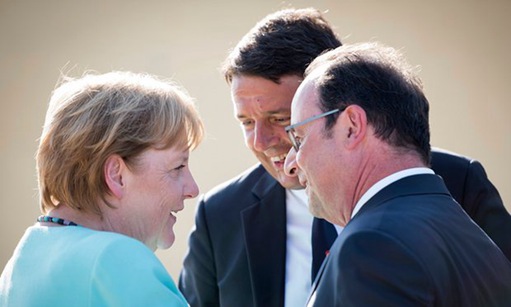导读:当大家拭目以待,英国会不会真的脱欧时,欧洲内部国家,却因为单词Brexit的阴阳性闹得不可开交。所以,它到底是阴是阳呢?

The EU may be agreed on its response to Britain’s vote to leave, but on one key question it remains divided: is Brexit masculine or feminine?
欧盟可能会同意英国票选脱欧的要求,但是,仍有一个关键问题存在分歧:英国脱欧(Brexit)这个单词,是阳性的?还是阴性的?
In French, Britain’s decision to leave the European Union is known as le Brexit, either – although the Académie Fran?aise has yet to rule on the question – because new words in French are almost invariably masculine, or because nouns ending in “t” mostly are (with a few exceptions: la nuit, la forêt, la plupart).
在法语里,英国决定离开欧盟被称为Brexit。尽管法兰西学院仍未对Brexit阴阳性这个问题进行裁决,但是因为法语中所有新单词几乎都是阳性词,或者以t结尾的名词几乎都是阳性词(除一些特例:la nuit, la forêt, la plupart),所以Brexit可能被认定为阳性词。
Germany, also, appears to have pretty much decided that der Brexit is a male thing. This might seem odd since several German nouns ending in “it” (das Fazit, meaning conclusion, das Dynamit, dynamite) are neither masculine nor feminine, but neuter.
德国似乎也可能认定Brexit为阳性词。自从几个以it结尾的德语名词(das Fazit, meaning conclusion, das Dynamit, dynamite)被认定为既不是阳性词语,又不是阴性词,而是中性词以来,将Brexit看作阳性词似乎有点儿奇怪。
But as any German learner knows, what makes a noun feminine, masculine or neuter in German is somewhat less clear than in Latin languages.
但是学习德语的人都知道,相比拉丁语,怎么认定一个单词是阳性,阴性或者中性,在德语中并不那么一目了然。
Spain, too, has plumped for el Brexit, like most English loan words that become masculine by default in Spanish. That’s because they rarely end in “o” (generally masculine) or “a” (generally feminine) like most Spanish nouns, and given the choice, Spain, being a Latin country, opts for male.
像所有被西班牙语默认为阳性的英语外来词一样,西班牙也将单词Brexit认定为阳性词。这是因为这些单词很少像西班牙名词一样,以O(通常表示阳性)或者a(通常表示阴性)结尾,所以西班牙作为一个拉丁语国家,选择将这些词语归类为阳性。
Italy, for the time being at least, is resisting the trend – and its language police, the Accademia della Crusca, has published a fabulously lengthy explanation as to why. Debating whether Italians should say plain Brexit (without a preceding article), il Brexit or la Brexit, the academy finds firmly in favour of the last.
至少就目前而言,意大利在抵制这种趋向,它的语言政策机构布兰学院发布了一段极长的解释,说明为什么这个单词不是阳性词。在辩论是否意大利人应该说Brexit为Brexit(前面没有冠词),il Brexit(阳性冠词) 或者 la Brexit(阴性冠词)时,学院坚定支持最后一种。
As with most things in Europe, France and Germany, once agreed, are likely to end up on the winning side in the Brexit gender war, as the former Labour Europe minister Denis MacShane observed in a tweet. Britain, for its part, will doubtless hope for more disunity once the real Brexit battle starts
前欧洲劳动部长丹尼斯在推特中观察道,就像欧洲、法国和德国的绝大多数事情一样,一旦经过同意,往往是取得Brexit词性之争胜利的一方一统天下。就英国而言,无疑希望在真的Brexit词性大战开始之际,存在多元的声音。



